Engine Oil Change Calculator
How Often Should You Change Your Oil?
Your Oil Change Recommendation
Next Change Mileage: km
Oil Condition:
Cost Comparison
Oil Change Cost: $60-$100 Potential Repair Cost: $3,000+
Skipping oil changes risks engine failure - equivalent to spending $3,000 for a $100 maintenance
Engine oil isn’t just something you pour into your car every few thousand kilometers. It’s the lifeblood of your engine. Without it, your engine doesn’t just wear out-it seizes, melts, or explodes. You might think it’s just a slippery fluid that keeps things quiet, but that’s like saying water is just a wet thing. It’s way more than that.
It Reduces Friction Between Moving Parts
Your engine has dozens of metal parts moving at thousands of revolutions per minute. Pistons slam up and down. Crankshafts spin. Valves open and close. All of this happens inside a space smaller than a shoebox. Without oil, those parts would grind against each other like sandpaper on steel. The heat from that friction alone could melt aluminum pistons in under a minute.
Engine oil creates a thin, slippery film between these surfaces. It doesn’t just make things slide-it keeps them from touching at all. Modern synthetic oils can maintain this film even under extreme pressure. That’s why your engine doesn’t turn into scrap metal after 5,000 kilometers. It’s not magic. It’s physics, and oil is the hero.
It Cools Critical Engine Components
You might think the radiator does all the cooling. It doesn’t. The radiator handles the coolant, which cools the engine block and cylinder head. But what about the pistons, bearings, and camshaft? They’re buried deep inside the engine, where coolant can’t reach.
Engine oil picks up heat as it flows through those hot zones. It carries that heat to the oil pan, where it slowly releases into the air. In high-performance engines, oil even flows through special cooling jets that spray the undersides of pistons. That’s why racing engines run hotter but don’t fail-they’re bathed in oil that’s doing double duty as a coolant.
It Cleans Out Dirt and Debris
Even the cleanest air has dust. Even the best fuel leaves behind tiny carbon bits. Over time, those particles build up inside your engine. If they stayed there, they’d scratch surfaces, clog oil passages, and cause premature wear.
Engine oil contains detergents and dispersants. These chemicals grab hold of dirt, sludge, and carbon deposits and hold them in suspension. That’s why your oil turns black after a few hundred kilometers-it’s doing its job. The oil filter then catches those particles before they can circulate again. Change your oil, and you’re removing all that trapped grime. Don’t skip it.
It Prevents Corrosion and Rust
Engine parts are made of steel and iron. Left exposed to moisture and combustion byproducts, they’ll rust. Even small amounts of rust can flake off and become abrasive particles. That’s a one-way ticket to engine failure.
Engine oil coats every internal surface with a protective film. It acts like a rust inhibitor, shielding metal from water vapor, sulfuric acid (from combustion), and other corrosive compounds. That’s why engines that sit unused for months still start up-oil kept the metal protected. If you’ve ever opened up a neglected engine and seen shiny, untouched parts, that’s oil’s quiet work.
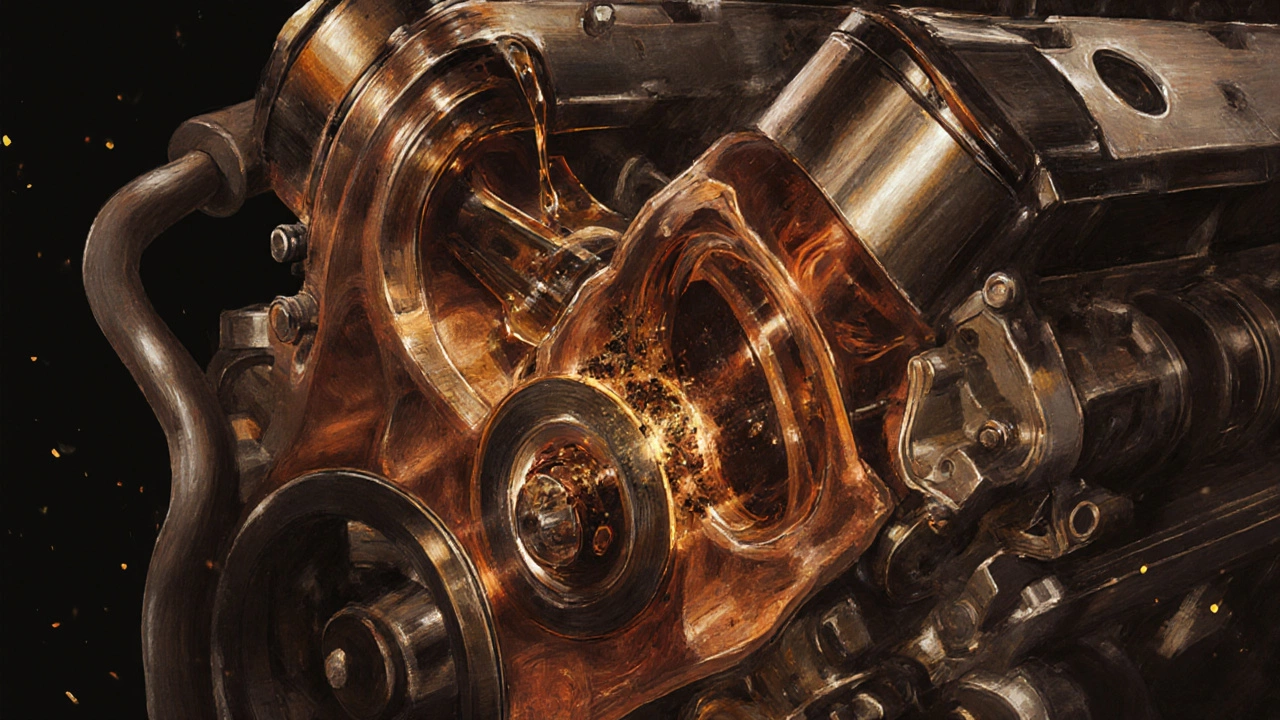
It Seals the Gaps Between Piston Rings and Cylinders
There’s a tiny gap between your piston rings and the cylinder wall. It’s meant to be there. But if it’s too big, you lose compression. That means less power, worse fuel economy, and blue smoke out the tailpipe.
Engine oil fills that gap. It creates a seal that keeps combustion gases from leaking down into the crankcase. That’s why old engines with worn rings burn oil-they can’t seal properly anymore. Fresh oil helps maintain that seal, even in aging engines. It’s not just lubricating-it’s helping your engine hold pressure like a tire holds air.
It Reduces Noise and Vibration
That ticking or knocking sound you hear when you start your car on a cold morning? That’s metal hitting metal. Oil quiets that down. It cushions moving parts, absorbs shocks, and smooths out the rough edges of engine operation.
Hydraulic lifters, timing chains, and valve trains all rely on oil pressure to function quietly. Low oil or old, thickened oil means more noise. It’s not just annoying-it’s a warning sign. The louder your engine sounds, the more it’s fighting against itself.
It Transfers Power in Hydraulic Systems
Modern engines don’t just use oil for lubrication. Many rely on oil pressure to operate critical systems. Variable valve timing (VVT), turbocharger actuators, and even some clutch systems use oil as a hydraulic fluid. If the oil is dirty or low, these systems don’t respond correctly.
Think of it like a hydraulic jack. If the fluid is gummy or low, the jack doesn’t lift. Same with your engine. Dirty oil means your VVT system can’t adjust timing properly. That leads to poor fuel economy, rough idle, and even check engine lights.
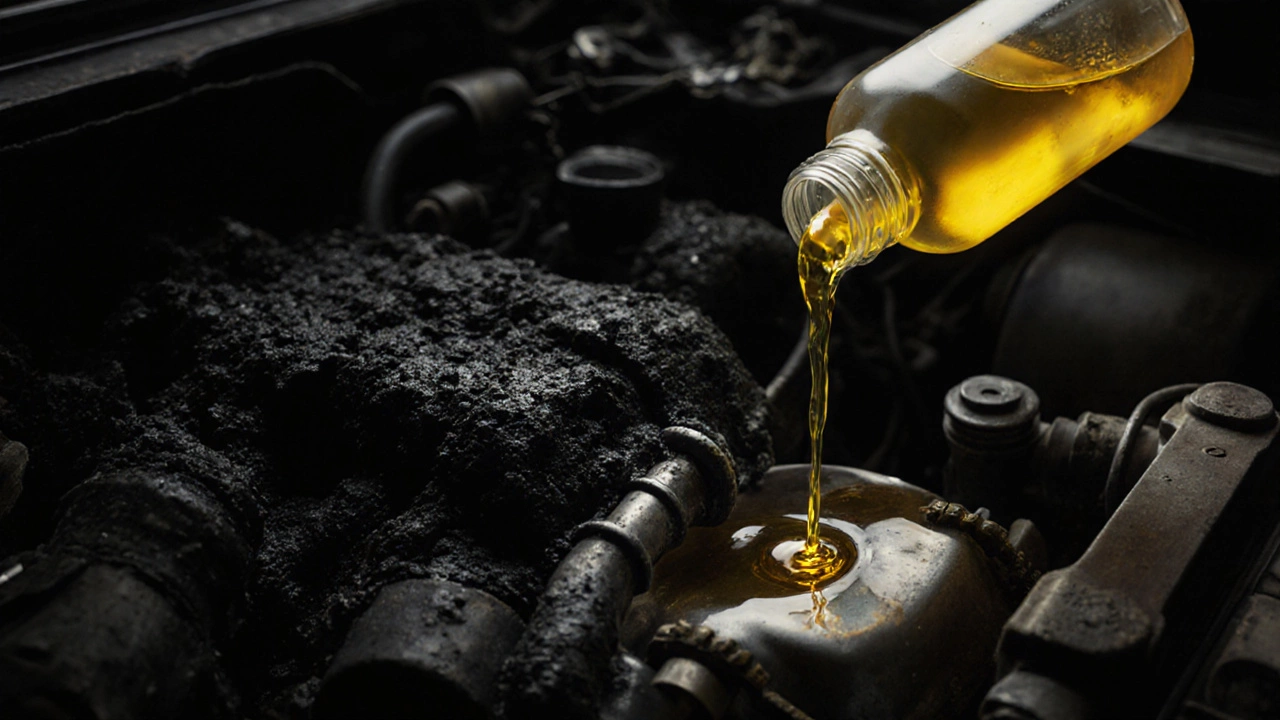
What Happens If You Skip Oil Changes?
People say, “My car’s still running fine.” That’s true-for now. But engine oil breaks down over time. Heat, pressure, and contaminants turn it from a clean lubricant into a thick, acidic sludge. That sludge clogs oil passages. It sticks to valves. It stops flowing where it’s needed most.
Here’s what happens when you ignore oil changes:
- After 10,000 km without a change: Oil loses 60% of its lubricating power.
- After 15,000 km: Sludge starts forming in the oil galleries.
- After 20,000 km: Bearings begin to wear. Oil pressure drops.
- After 30,000 km: Engine failure becomes likely. Repair costs exceed $3,000.
That’s not a myth. That’s what mechanics see every day. One client in Auckland brought in a 2018 Toyota Camry that had gone 40,000 km without an oil change. The oil was black and chunky. The oil pump was clogged. The engine had to be replaced. The oil change would’ve cost $80. The repair cost $4,200.
How Do You Know What Oil to Use?
Not all oils are the same. Your car’s manual tells you exactly what to use. Look for two things: viscosity grade (like 5W-30) and specification (like API SP or ACEA C3).
Viscosity tells you how thick the oil is at different temperatures. 5W-30 means it flows like a thin 5-weight oil when cold (for easy starts) and thickens to a 30-weight when hot (for protection). Using the wrong viscosity can cause poor lubrication or increased fuel use.
Specifications matter too. API SP is the latest standard for gasoline engines. It’s designed for modern engines with turbochargers, direct injection, and variable valve timing. Older oils like API SN won’t protect these engines properly.
Stick to what your manual says. Don’t guess. Don’t listen to the guy at the gas station who says “this one’s better.” Your engine was engineered for a specific oil. Use it.
What About Synthetic vs. Conventional Oil?
Synthetic oil is engineered in a lab. It has uniform molecules. Conventional oil is refined from crude. Its molecules are irregular and break down faster.
Synthetic oil lasts longer, flows better in cold weather, resists heat better, and cleans more effectively. It’s not magic-it’s science. And it’s worth it.
Most new cars today require synthetic oil. Even if yours doesn’t, switching to synthetic can extend engine life. You’ll pay more per change, but you’ll go longer between changes. And your engine will thank you.
Final Thought: Oil Is Cheap. Engines Are Not.
Engine oil costs less than a coffee at the drive-thru. A full change? Around $60-$100, depending on your car. That’s less than a new pair of shoes. But skipping it? That’s gambling with a $10,000 engine.
Every time you change your oil, you’re buying time. Time for your engine to run smoothly. Time for your car to hold its value. Time for you to avoid a tow truck at 2 a.m.
It’s not complicated. Check your oil level once a month. Change it when your car says to. Use the right type. That’s it. The rest? That’s just the engine doing its job-because you did yours.
Can I just top up my engine oil instead of changing it?
No. Topping up oil doesn’t fix old, dirty, or broken-down oil. It just adds fresh oil to contaminated fluid. The dirt, sludge, and acids are still in there. You’re diluting the problem, not solving it. Oil changes remove all the contaminants. Topping up only delays the inevitable.
Why does my engine oil turn black so fast?
That’s normal. Modern oils contain detergents that clean carbon deposits from your engine. The black color means the oil is doing its job-grabbing dirt and holding it in suspension. If your oil stayed clear after 5,000 km, that would mean it’s not cleaning anything. That’s a bad sign.
Is it okay to use diesel oil in a gasoline engine?
No. Diesel oils are formulated for different combustion byproducts and higher soot levels. They often have higher detergent levels and different additive packages. Using diesel oil in a gasoline engine can cause seal damage, increased wear, and poor fuel economy. Always use oil labeled for gasoline engines (look for API SP or ILSAC GF-6).
How often should I check my engine oil level?
Check it at least once a month, and always before a long trip. Modern engines can burn oil without leaking. A drop in oil level between changes is normal-but if you’re adding more than a liter between changes, something’s wrong. Get it checked.
Can I mix synthetic and conventional oil?
Yes, you can mix them in an emergency. But it’s not ideal. Synthetic oil has better performance and stability. Mixing them dilutes those benefits. If you’re topping up, use the same type as what’s already in the engine. For best results, stick to one type and change it regularly.
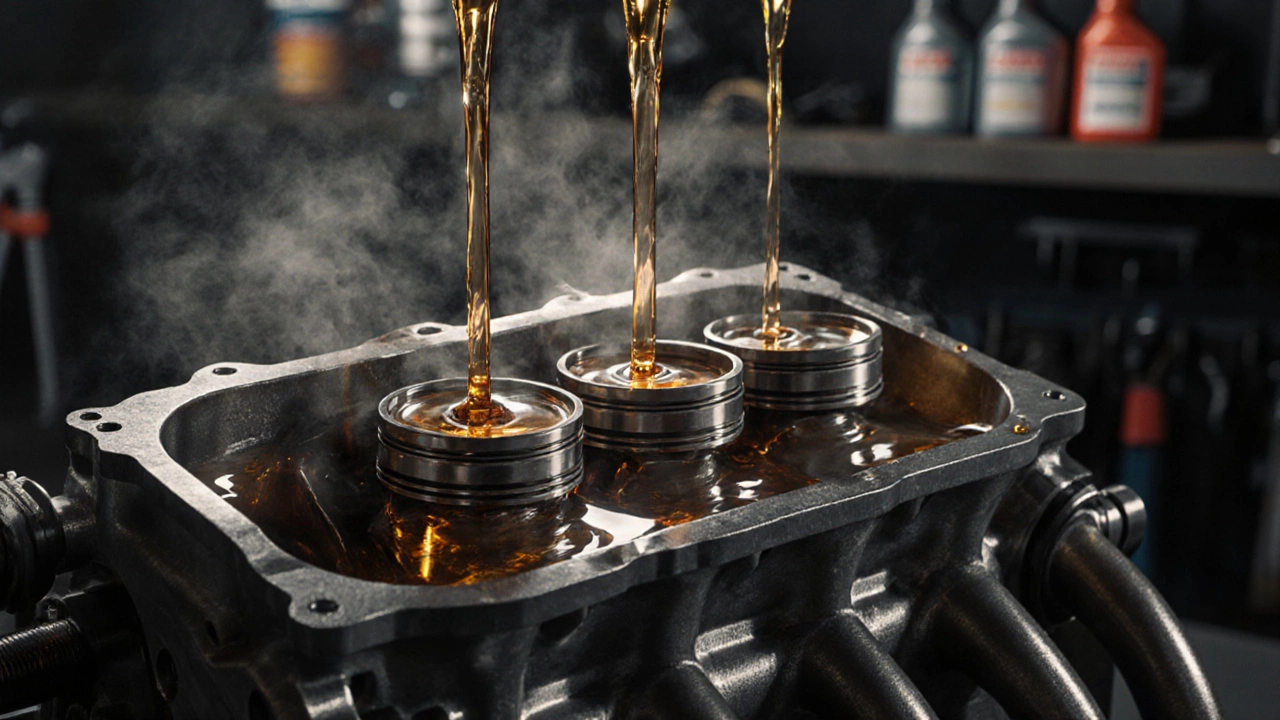
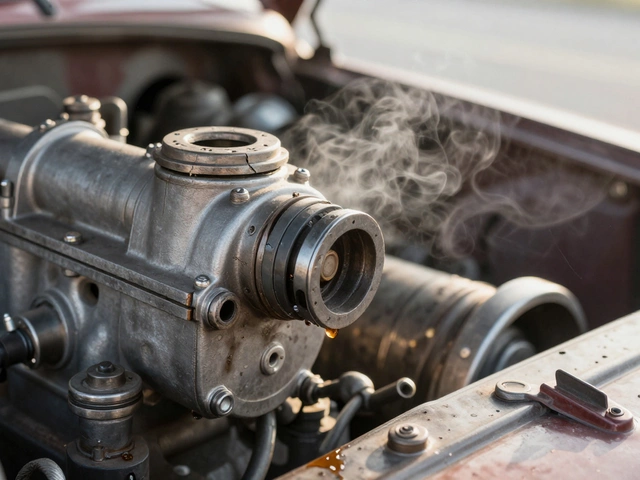

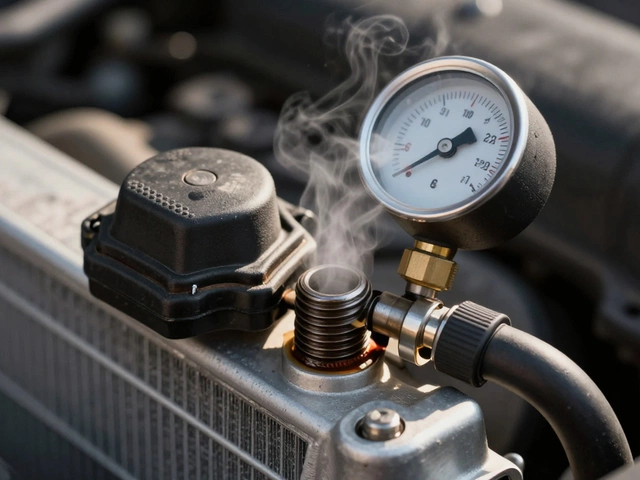
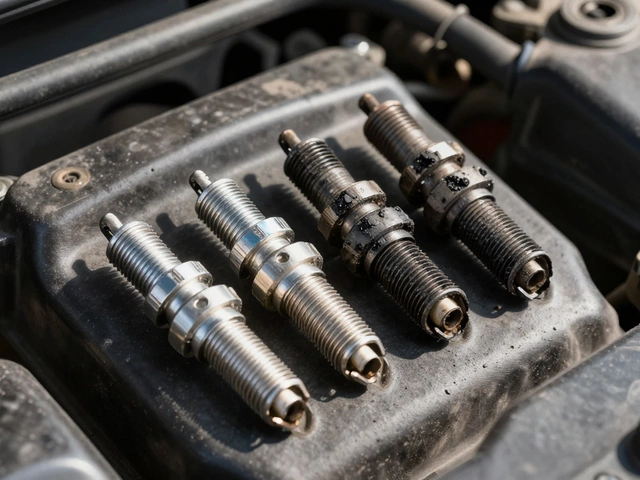





Write a comment